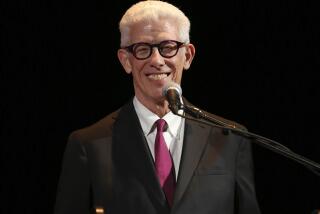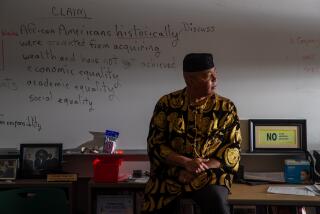Scholar-in-Residence : Teacher’s African Works Find Home at CSUN
- Share via
NORTHRIDGE — Boniface I. Obichere, a smiling and always dapper African-born professor, was a man who set out to prove that black Americans were simply distant relatives lost at sea.
“He wanted to show young people, especially African Americans, about Africa in a positive way,” said his wife, Armer Obichere. “Maybe he could inspire them to go over to Africa, back to the motherland and see what it was like. He wanted to bridge the gap between the African American and the African people.”
Friday afternoon students at Cal State Northridge began taking steps over the bridge that Obichere built.
More than 4,200 books, African artwork, research material, photographs, letters and other items Obichere (o-ba-CHER-ry) collected during his 30-plus years as a professor of African studies and history at UCLA were unveiled at a reception sponsored by the Pan-African studies department.
As about 75 festive friends, academic colleagues and even his 25-year-old son Chikere looked on, CSUN President Blenda J. Wilson dedicated the collection.
“The real voyage of discovery consists not in teaching new matters, but in having new eyes,” Wilson said to the crowd. “Through the generosity of the Obichere family, we will be able to share his eyes and some of his voyage.”
With help from a special collections expert from the CSUN library, Pan-African studies professor Joseph Holloway will oversee the Boniface I. Obichere Library and Institute. Holloway said the center will continue the work of the internationally known scholar and also encourage graduate and undergraduate students to concentrate on bettering their research skills. Obichere had vast knowledge of world history, but was particularly well versed in the culture, politics and economics of Africa and blacks in America.
David L. Horne, chairman of the Pan-African studies department, said he and Holloway, along with other old and new students, visited with Obichere before the Nigerian professor died of prostate cancer in March. At his deathbed, they promised to take special care of the material and turn it into a working resource for students.
“I’ve known the man since 1971 when I was a student at UCLA,” Holloway said smiling. “I was at his house often as a student and a friend. He was more than just a mentor. He was like a father.”
Students like Holloway and Horne, both 49, remember waiting for hours to talk to the “African with the Oxford accent.” In the office of the man they nicknamed “Obi,” students of all races could find solace, whether moaning about dissertations or just pouring out their personal problems. He would always listen.
“He felt that it was important that black Americans as well as Africans show their intelligence and be counted at the university,” Armer Obichere said about her husband’s commitment to his students. “Because of the discrimination that had happened in the past, he wanted them to be able to hold their own intellectually against anyone. And he knew and had faith that they would do that.”
“Obichere was someone who built his reputation on his teaching first and then his research,” added Kendahl Ratcliffe, one of Obichere’s most recent doctoral students. “Most professors do it the other way around.”
Darryl Gatlin, another ex-student, teacher’s assistant and friend, said Obichere knew how to bring the best out of anyone. “He was critical but in a loving way,” Gatlin said before breaking out into a smirk. “One time he told me: ‘Darryl, your writing is like a dead cat. It’s limp. You need to take it back and go put feet upon it so it can walk on its own.’ ”
Obichere arrived at UCLA in 1967, a time when black and African studies departments across the country had just begun to hire black or African instructors to teach their own histories.
“Once he got hired in the history department, he became a part of this evolution of African studies as an established discipline of higher education in this country,” said Horne. Obichere also believed in linking African studies with the emerging study of black America. “He was one of the first professors to demand that the two fields be viewed as interdisciplinary, since blacks had come from Africa anyway.”
In a 1968 essay entitled “African History and Western Civilization,” Obichere argued that the study of people of African descent was not only interesting, but vital to world history.
“It seems to me that the study of the black experience, which includes African history in its broadest interpretation, is a worthwhile academic endeavor,” Obichere wrote. “It is enriching. In the words of Ron Karenga, it might ‘add some zest and some vim and some vigor’ to the study of the bland ‘European existence.’ ”
At UCLA Obichere served as director of African studies from 1972 to 1978. When visiting African dignitaries came to town, he invited his students over to his Wilshire-area home to meet them. He was so well known in Africa that when his remains were returned to Nigeria, scholars and leaders throughout the continent flocked to his traditional African funeral, which included an all-night wake, dances and a traditional libation ceremony, praying and pouring out wine as a toast to Obichere’s memory.
“He was a man who planted many seeds,” Ratcliffe said. “And because of his inspiration, we are all sort of living testaments to his life and his life’s work. We have a responsibility to continue his legacy whether in the form of a library or through our own research.”
Born in 1932 in the village of Awaka Owerri in eastern Nigeria, Obichere attended Catholic schools. His father, Ogbuagu, was a “warrant chief,” a local leader selected by the British colonialists to watch over the land and maintain peace with the people in the area. As the only son of his father’s fourth wife, Obichere was eager to prove himself worthy of his family’s name.
Clement Udeze, a history professor at Cal State Dominguez Hills, met Obichere in Nigeria when they were at Mt. St. Mary’s Teacher’s College in Azaraebelu. They became friends immediately while preparing for teacher exams.
“We spent many a night literally burning the midnight oil and studying to get admitted to the university,” Udeze said. “We discussed where we would go for school. And of course, America was No. 1.”
Obichere passed his tests and earned a full scholarship to the University of Minnesota, where he earned bachelor’s and master’s degrees with honors in history. He then headed to UC Berkeley. Armer Obichere remembers in 1962 when they met while she was a undergraduate student at San Francisco State and he was a graduate student.
“It was love at first sight,” she recalled. “I thought he was the most brilliant person I’d ever met. He was very well-read and articulate.”
As their love for each other grew, Armer found herself discovering Africa through Boniface, while he learned about the struggles of African Americans. “I was involved in the civil rights movement and he would come along with me,” she said, looking toward a table of photos of memorabilia at her home. “Through us I think he saw a different dimension of the students and what was going on.”
He was studying European history at UC Berkeley when he met Malcolm X on a panel at the campus. “Malcolm X is the one who suggested that he study African history so he could teach us about Africa,” Armer remembers. “My husband thought that was a good idea. So he applied to go to Oxford University in England and he got accepted.”
When Obichere went off to Oxford, he and Malcolm X remained friends, writing and speaking every few weeks. At the time of Obichere’s death, he was working on a history of Malcolm X’s life in America and Africa. He also served as a consultant to Spike Lee’s movie on the slain civil rights icon.
“They helped each other,” Holloway said about the relationship. “Where Dr. Obichere was able to introduce Malcolm to some of the issues in African history, Malcolm was able to enlighten him about the African American experience.”
At Friday’s dedication ceremony at CSUN, his friends and family celebrated not only Obichere’s academic record, but his lifelong commitment to Africa and African Americans.
“Even in the end, he maintained his faith in humanity and his belief in God,” Udeze said. “And I think he had faith in the cause of the black man all over the world. It was one of his greatest concerns, to bring the black man to a position of parity with the rest of mankind.”
More to Read
Sign up for our Book Club newsletter
Get the latest news, events and more from the Los Angeles Times Book Club, and help us get L.A. reading and talking.
You may occasionally receive promotional content from the Los Angeles Times.







